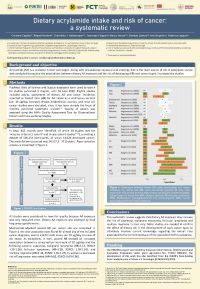Abstract
Objectives: To explore the association between dietary acrylamide exposure and the risk of different cancers in prospective studies.
Methods: PubMed, Web of Science and Scopus databases were searched for studies published in English, until 18 June 2020. Eligible studies included adults, assessment of dietary acrylamide and cancer incidence, reported as hazard ratio (HR) for acrylamide intake as a continuous variable (per 10μg/day increase). Breast, endometrial, ovarian, and renal cell cancers were excluded. Quality of papers was assessed using the NIH’s Quality Assessment Tool for Observational Cohort and Cross-sectional Studies.
Results: Out of the 855 papers identified, 10 were included, providing a dataset of 526,151 participants, of which 13,629 developed cancer. The mean follow-up period was 14.5 years. All studies were found to have fair quality. Multivariate-adjusted pooled HR showed no clear association for almost all cancer diagnosis included per 10μg/day increase of exposure. As exceptions, in men, pooled HR showed an increased association between a consumption increment of 10μg/day and the following cancers: cutaneous malignant melanoma [HR=1.13 (95%CI:1.10-1.26)], follicular lymphoma [HR=1.28 (95%CI:1.03-1.61)], and multiple myeloma [HR=1.14 (95%CI:1.01-1.27)]. In women a decreased risk of lung cancer was noted [HR=0.82 (95%CI:0.69-0.96)].
Conclusions: This systematic review suggests that dietary acrylamide exposure may increase the risk of cutaneous malignant melanoma, follicular lymphoma and multiple myeloma in men only. More studies are needed to confirm the effect of dietary acrylamide in the development of each cancer type, to improve current knowledge regarding the risks associated to the current exposure of the population to this substance.
Funding: The HBM4EU project has received funding from the European Union’s Horizon 2020 research and innovation programme under grant agreement No 733032. The development of this work has also benefited from the ISAMB’s base-funding from Fundação para a Ciência e a Tecnologia (Ref. UID-B/04295/2020).

